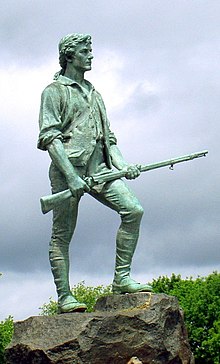John Parker (captain)
| John Parker | |
|---|---|

Henry Hudson Kitson's The Lexington Minuteman statue (1900) — originally symbolizing the generic Minuteman — has come to represent Parker. It stands in Lexington Battle Green. No portrait, from life, of Parker, is known to exist.
|
|
| Born |
July 13, 1729 Lexington, Province of Massachusetts Bay (British Royal Colony) |
| Died | September 17, 1775 (aged 46) Lexington, Province of Massachusetts Bay (British Royal Colony) |
| Allegiance |
|
| Service/branch | Militia |
| Years of service | 1754-1763 1775 |
| Rank | Captain |
| Battles/wars | |
| Other work | farmer, mechanic, soldier, colonial militia officer |
John Parker (July 13, 1729 – September 17, 1775) was an American colonial farmer, mechanic, soldier, and colonial militia officer who commanded the Lexington, Patriot, colonial militia at the Battle of Lexington on April 19, 1775.
John Parker was born in Lexington, Massachusetts to Josiah Parker and Anna Stone. He was a descendant of Deacon Thomas Parker, founder of Reading, Massachusetts. John Parker was also the grandfather of reformer and abolitionist Theodore Parker. John Parker's experience as a soldier in the French and Indian War (Seven Years' War), at the Siege of Louisbourg, and the conquest of Quebec most likely, led to his election, as militia captain, by the men of the town. He was dying from consumption (tuberculosis), on the morning of April 19, 1775, and had not quite five months left to live.
On April 19, 1775 the British commander in Boston Thomas Gage despatched an expedition of around 700 regulars under Colonel Francis Smith to search the town of Concord for hidden supplies and weapons. Lexington lay directly on the road that Smith's men took to reach Concord.
When reports of the approach of a sizeable force of British soldiers reached Lexington overnight, men from the town and the surrounding area began to gather on the Common. Parker's Lexington company were not minutemen, as sometimes stated, but from the main body of Massachusetts Militia. Parker was initially uncertain as to exactly what was happening. Conflicting stories arrived and as the British regulars had spent much of the winter engaged in harmless route marches through the Massachusetts countryside their exact intention was far from certain.
...
Wikipedia
